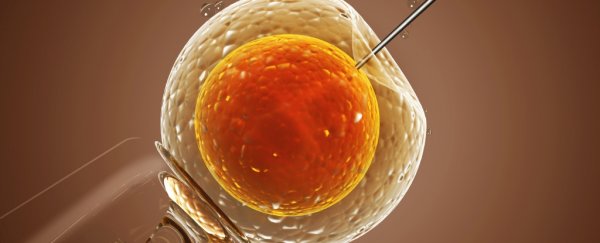A group of stem cell researchers in the UK has applied for permission to genetically modify human embryos in an attempt to better understand what happens in the earliest stages of human development and hopefully reduce the incident of miscarriage.
The request will "considered in due course", according to local regulatory body, the Human Fertilisation and Embryology Authority (HFEA).
The application comes just a few months after researchers in China admitted to altering the genes of human embryos to try and eliminate a genetic blood disorder. Changing an embryo's genes for therapeutic purposes in this way is illegal in most other parts of the world, due to concerns that people will use the technology to create 'designer babies'. But in the UK it's possible for research purposes with approval from the HFEA.
Now researchers have sought this approval for the first time and, if permission is granted, it'll be the first time a national regulatory body has allowed this type of work, and it's no understatement to say the whole world will be watching.
The researchers from the Francis Crick Institute in London say their research will "improve embryo development after in vitro fertilisation (IVF) and might provide better clinical treatments for infertility". The embryos they intend to use would be donated by couples who have excess embryos during IVF. Importantly, these embryos wouldn't be grown to term; they will simply be used to study the early stages of embryonic development before being destroyed.
The team will use a gene-editing tool known as CRISPR/Cas9 to turn certain genes on and off in very early stage human embryos, and then study the effects that these changes have on the development of the embryo. "It is essential to study the function of these human genes in the context of the embryo in order to fully understand their roles," group leader Kathy Niakan told Ian Sample over at The Guardian.
The CRISPR/Cas9 technique works kind of like a biological 'cut and paste' tool, where researchers use a protein to seek out a particular gene and cut it out of the genome, replacing it with DNA of their choice - for example, they could swap a defective gene for a healthy one. This technique has been around for the past three years, but in recent months has become a lot cheaper and easier to use.
It's the same technique that the Chinese researchers used to edit the genome of their embryos and, as a result, there's been a strong push for a moratorium - or ban - on all research using CRISPR/Cas9. The fear is that if these embryos could be grown to term, their new traits would be heritable, and researchers would have crossed a major ethical boundary. An outright ban has already been put in place in the US.
But earlier this month a group of leading scientists issued a joint statement against the moratorium, suggesting that the CRISPR/Cas9 technique could also be incredible useful for researchers. "We believe that genome editing technologies may hold significant potential for clinical application in the future; and we would be open to supporting the development of new therapeutic approaches should the evidence from research advance sufficiently to justify their use," they wrote in their statement.
While there's no word as yet on what HFEA decision will be, if there's any place this type of research could be approved (other than China) it's the UK, where a controversial three-parent IVF technique has already been allowed.
"Because of its history of successful regulation, the UK could serve as a model for other countries," Sarah Chan, a bioethics researcher at the University of Edinburgh, told Nature News.
We'll be watching to see what happens next.
